The Development of Google Search: From Keywords to AI-Powered Answers
From its 1998 rollout, Google Search has evolved from a fundamental keyword locator into a powerful, AI-driven answer framework. To begin with, Google’s revolution was PageRank, which positioned pages via the worth and count of inbound links. This pivoted the web clear of keyword stuffing in favor of content that acquired trust and citations.
As the internet grew and mobile devices multiplied, search practices altered. Google debuted universal search to fuse results (news, graphics, playbacks) and ultimately spotlighted mobile-first indexing to show how people essentially surf. Voice queries courtesy of Google Now and subsequently Google Assistant compelled the system to read informal, context-rich questions compared to concise keyword combinations.
The ensuing progression was machine learning. With RankBrain, Google got underway with comprehending hitherto novel queries and user meaning. BERT developed this by decoding the shading of natural language—relational terms, context, and links between words—so results more precisely fit what people implied, not just what they searched for. MUM increased understanding within languages and varieties, empowering the engine to unite connected ideas and media types in more evolved ways.
In the current era, generative AI is overhauling the results page. Innovations like AI Overviews combine information from many sources to produce to-the-point, circumstantial answers, repeatedly supplemented with citations and additional suggestions. This diminishes the need to select various links to build an understanding, while at the same time directing users to more thorough resources when they opt to explore.
For users, this transformation leads to hastened, more detailed answers. For authors and businesses, it credits richness, ingenuity, and coherence above shortcuts. In time to come, count on search to become continually multimodal—smoothly consolidating text, images, and video—and more unique, adapting to tastes and tasks. The voyage from keywords to AI-powered answers is in the end about modifying search from locating pages to getting things done.
